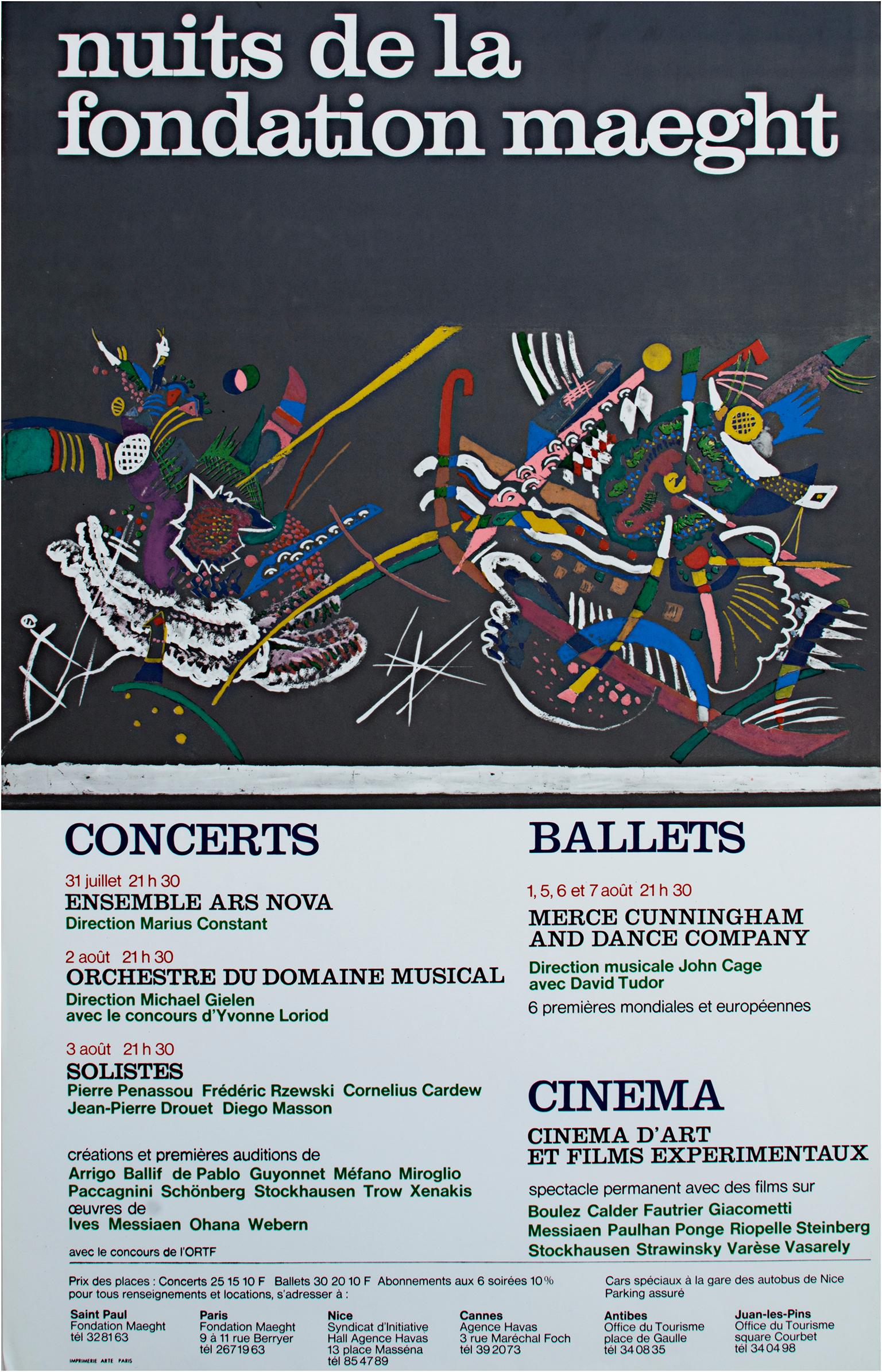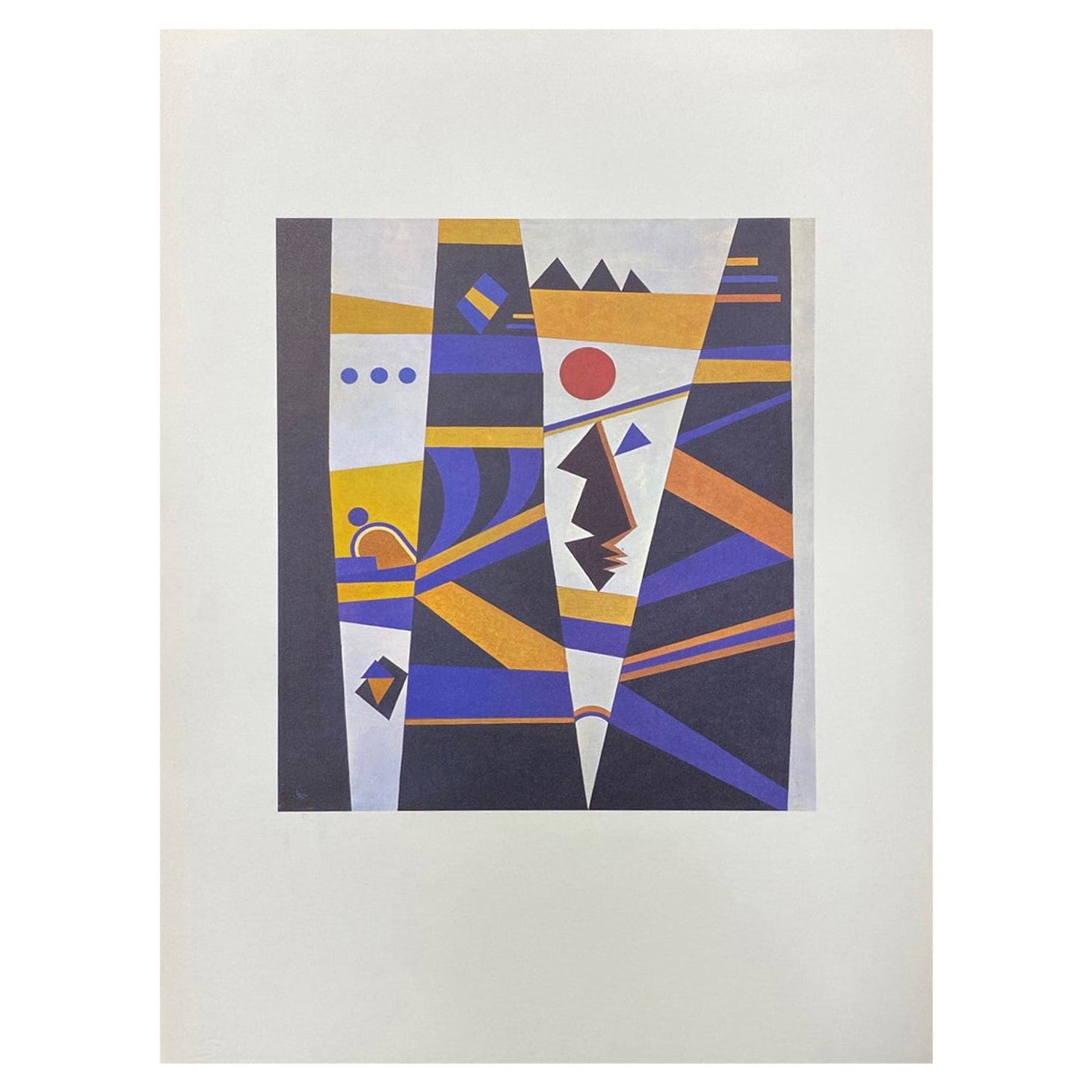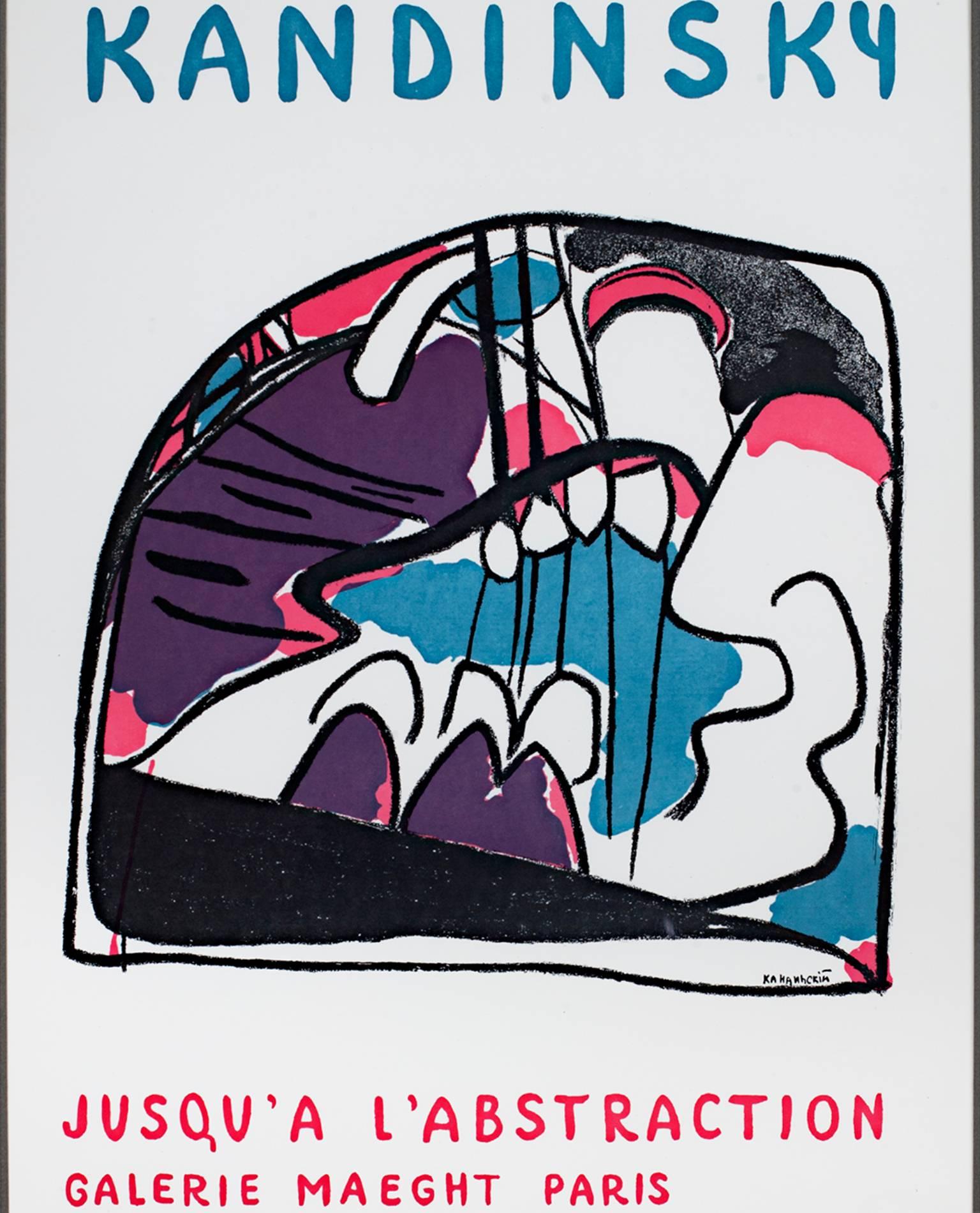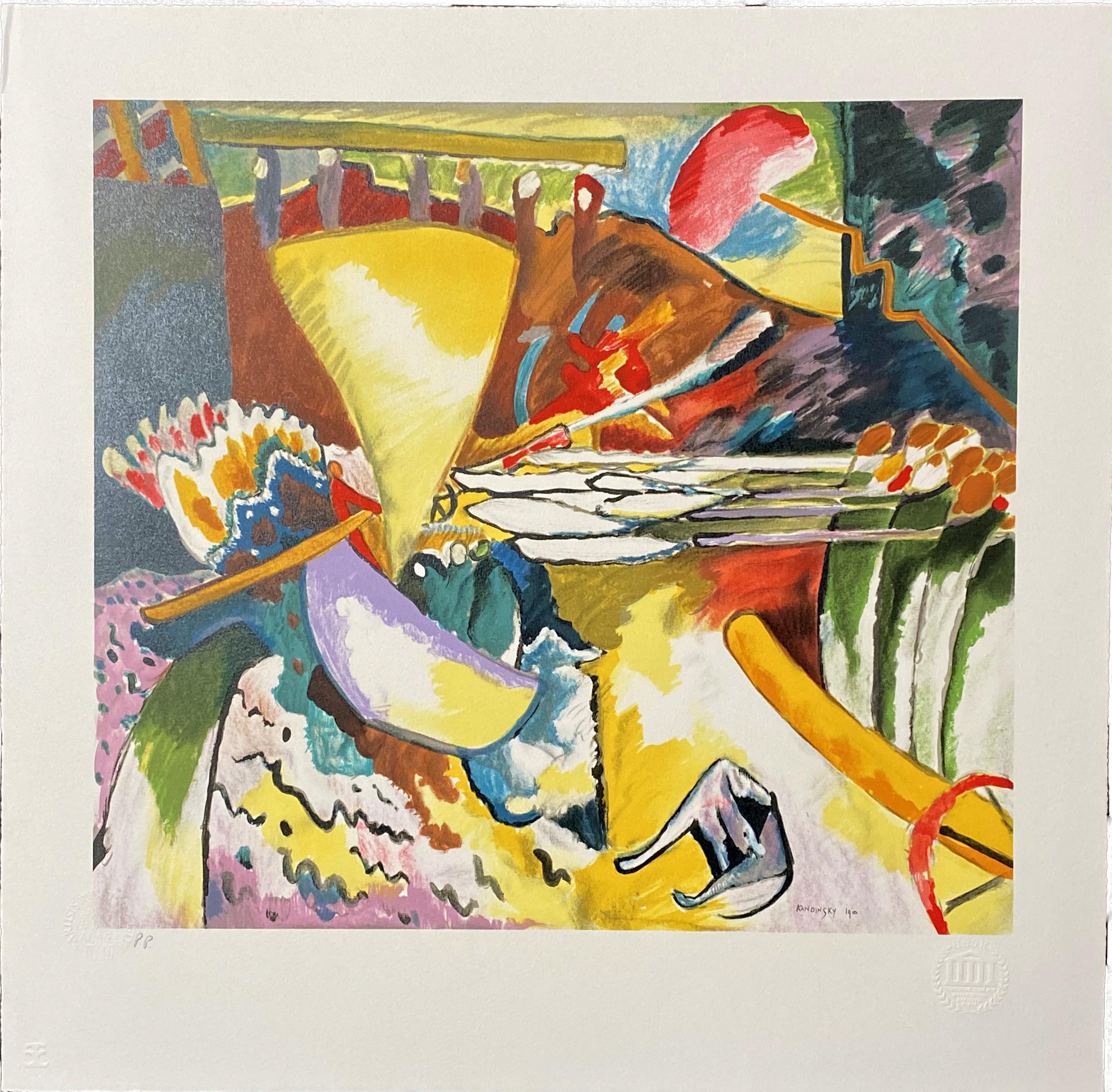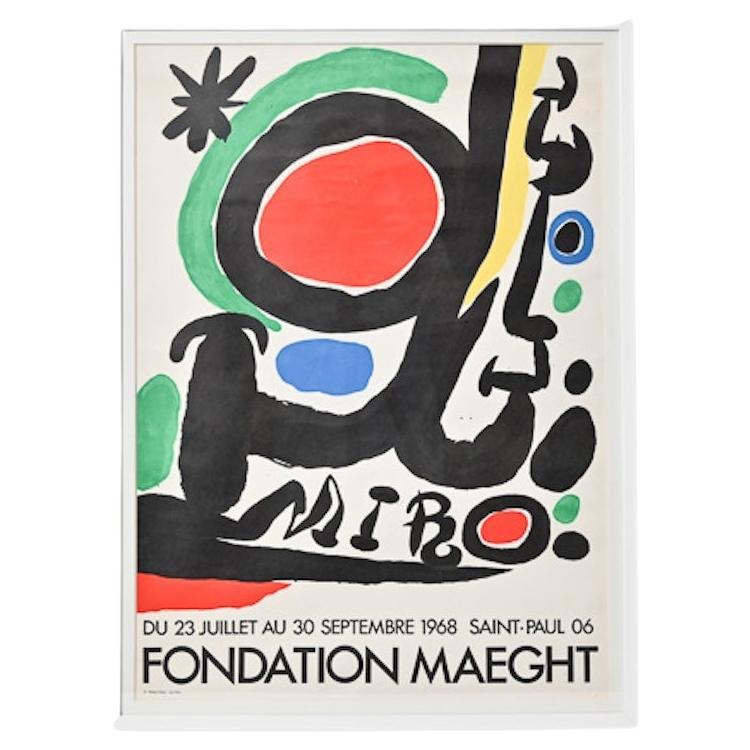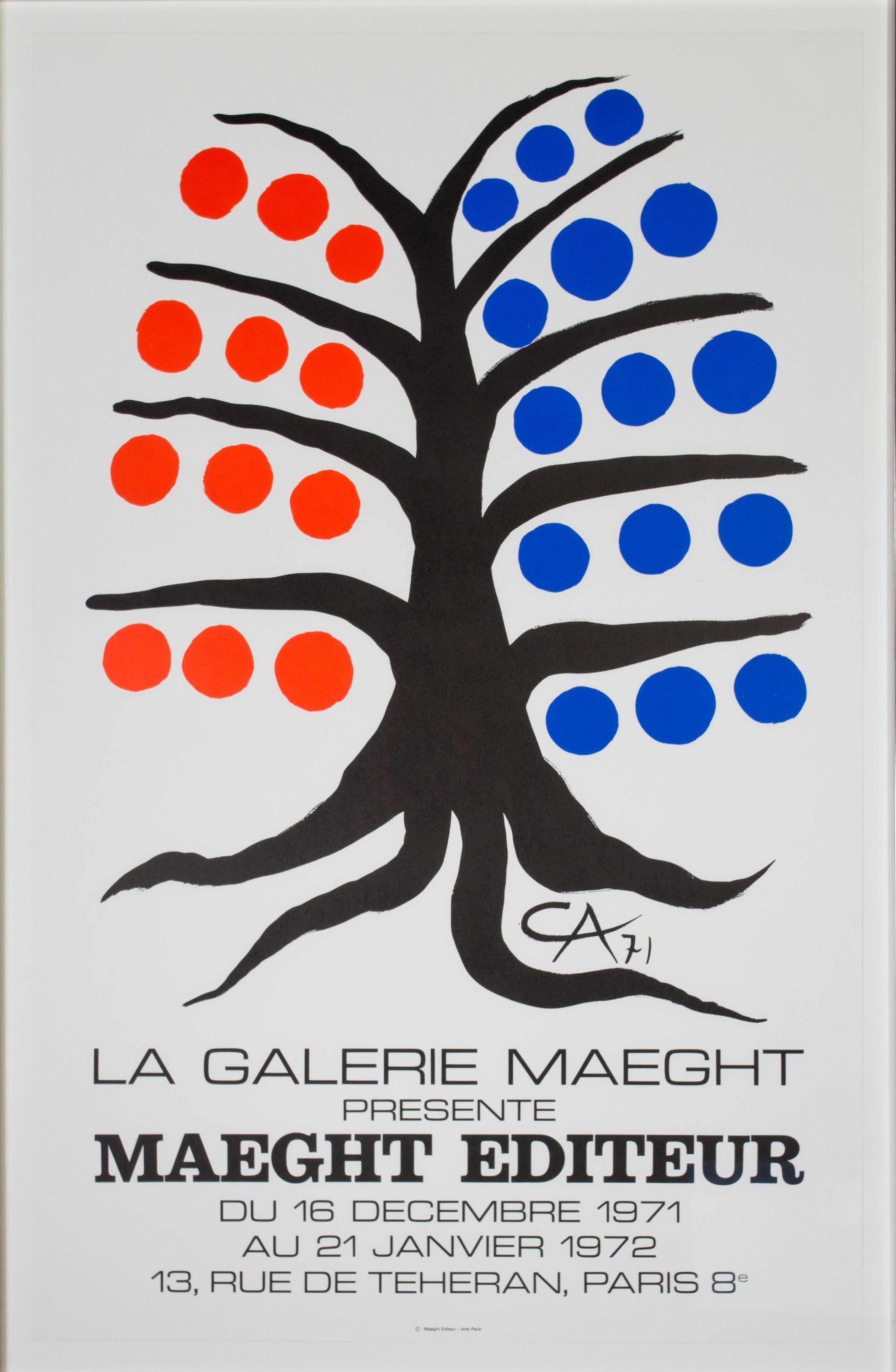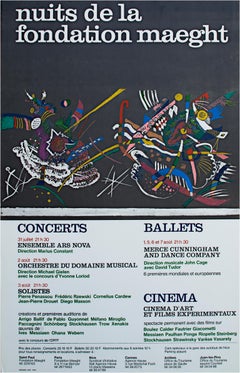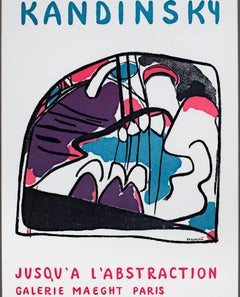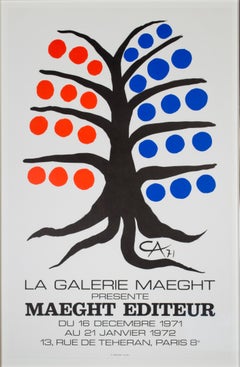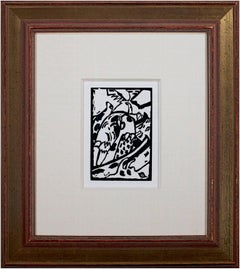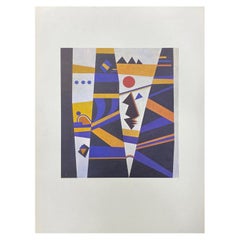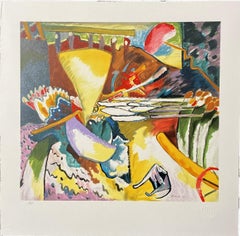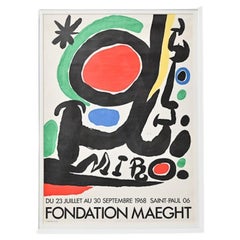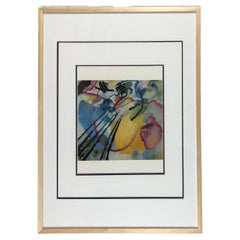Items Similar to 'Nuits de la Fondation Maeght' lithograph event poster
Want more images or videos?
Request additional images or videos from the seller
1 of 8
'Nuits de la Fondation Maeght' lithograph event poster1971
1971
$1,900
£1,422.82
€1,640.66
CA$2,670.53
A$2,917.55
CHF 1,530.54
MX$35,495.62
NOK 19,040.56
SEK 18,028.20
DKK 12,247.83
About the Item
This poster, published in 1971 for the Fondation Maeght, proudly boasts a lithographic rendering of Wassily Kandinsky's 1922 mural plans for the Juryfreie exhibition in Germany. It was in 1922 that Kandinsky was invited to teach at the Bauhaus in Weimar, Germany. There, he threw himself into an intensive period of artistic and theoretical production. With his students, the painter worked on monumental decors, including this mural cycle. The Bauhaus was closed in 1933 under the risign threat of Nazism, and Kandinsky ended this creative period and left for France. The composition places bursting forms of color against a dark black background, emblematic of the modern master's expressionist style. Unsigned.
This poster has been cut down from its original size. The text originally at the bottom is included on the back of the frame.
21 x 22.13 inches, artwork
29.5 x 30.88 inches, frame
Published by Imprimerie Arte Paris
Framed to conservation standards using archival materials including 100 percent rag mounting, UF5 Plexiglas to inhibit fading, and housed in a silver finish wood moulding.
Wassily Wassilyevich Kandinsky (16 December 1866 – 13 December 1944) was an influential Russian painter and art theorist. He is credited with painting the first purely abstract works. Born in Moscow, Kandinsky spent his childhood in Odessa. He enrolled at the University of Moscow, studying law and economics. Successful in his profession—he was offered a professorship (chair of Roman Law) at the University of Dorpat—he began painting studies (life-drawing, sketching and anatomy) at the age of 30.
In 1896 Kandinsky settled in Munich, studying first at Anton Ažbe's private school and then at the Academy of Fine Arts. He returned to Moscow in 1914, after the outbreak of World War I. Kandinsky was unsympathetic to the official theories on art in Communist Moscow, and returned to Germany in 1921. There, he taught at the Bauhaus school of art and architecture from 1922 until the Nazis closed it in 1933. He then moved to France where he lived for the rest of his life, becoming a French citizen in 1939 and producing some of his most prominent art. He died at Neuilly-sur-Seine in 1944.
- Creation Year:1971
- Dimensions:Height: 29.5 in (74.93 cm)Width: 30.88 in (78.44 cm)
- Medium:
- Movement & Style:
- After:Wassily Kandinsky (1866 - 1944, Russian)
- Period:
- Condition:
- Gallery Location:Milwaukee, WI
- Reference Number:Seller: 5434g1stDibs: LU60536506952
About the Seller
4.9
Platinum Seller
Premium sellers with a 4.7+ rating and 24-hour response times
Established in 1966
1stDibs seller since 2017
444 sales on 1stDibs
Typical response time: 2 hours
- ShippingRetrieving quote...Shipping from: Milwaukee, WI
- Return Policy
Authenticity Guarantee
In the unlikely event there’s an issue with an item’s authenticity, contact us within 1 year for a full refund. DetailsMoney-Back Guarantee
If your item is not as described, is damaged in transit, or does not arrive, contact us within 7 days for a full refund. Details24-Hour Cancellation
You have a 24-hour grace period in which to reconsider your purchase, with no questions asked.Vetted Professional Sellers
Our world-class sellers must adhere to strict standards for service and quality, maintaining the integrity of our listings.Price-Match Guarantee
If you find that a seller listed the same item for a lower price elsewhere, we’ll match it.Trusted Global Delivery
Our best-in-class carrier network provides specialized shipping options worldwide, including custom delivery.More From This Seller
View All"Nuits de la Fondation Maeght, " Event Poster by Wassily Kandinsky
By Wassily Kandinsky
Located in Milwaukee, WI
"Nuits de la Fondation Maeght" is a poster with an abstract composition by Wassily Kandinsky. This composition is from his 1922 mural plans for the Juryfreie e...
Category
1970s Abstract Abstract Prints
Materials
Color
Jusqu'a L'Abstraction' color lithograph poster Wassily Kandinsky
By Wassily Kandinsky
Located in Milwaukee, WI
"Jusqu'a L'Abstraction" is a lithograph poster by Wassily Kandinsky. This poster depicts abstract forms in purple, pink, blue, and black and was created for the Maeght gallery in Par...
Category
1940s Modern Abstract Prints
Materials
Lithograph
"Maeght Editeur, " Original Color Lithograph Poster
By Alexander Calder
Located in Milwaukee, WI
"Maeght Editeur" is a color lithograph poster. This poster was for an exhibit on Alexander Calder's work in Paris, France. It depicts a black tree with red fruits on the left side an...
Category
1970s Post-Modern Landscape Prints
Materials
Lithograph
'Improvisation 7' original first ed. woodcut from 'Klänge' by Wassily Kandinsky
By Wassily Kandinsky
Located in Milwaukee, WI
The present woodcut print comes from 'Klänge (Sounds),' a book of original graphics and poetry by Wassily Kandinsky. This first edition was released in an edition of 300, each book signed and numbered by the artist. The title of the album and this particular print, 'Improvisation,' demonstrated Kandinsky's interest in music and how abstract musical forms could be translated into images on a two-dimensional surface. This particular composition is difficult to read, but through the abstraction, one can make out various figures and a landscape beyond.
7.5 x 5 inches, image
22 x 19.5 inches, frame
Woodcut in black ink on laid paper (watermark Van Gelder Zonen)
Signed with encircled 'K' in the block, lower right
Framed to conservation standards using 100 percent acid free archival materials including silk-lined matting with 1/4 inch bevel, museum glass, and a gold-gilded moulding
Ref. Roethel 124
The Museum of Modern Art described 'Klänge (Sounds)' as follows:
Vasily Kandinsky's self-described "musical album," Klänge (Sounds), consists of thirty-eight prose-poems he wrote between 1909 and 1911 and fifty-six woodcuts he began in 1907. In the woodcuts Kandinsky veiled his subject matter, creating increasingly indecipherable images (though the horse and rider, his symbol for overcoming objective representation, runs through as a leitmotif). This process proved crucial for the development of abstraction in his art. Kandinsky said his choice of media sprang from an "inner necessity" for expression: the woodcuts were not merely illustrative, nor were the poems purely verbal descriptions. Kandinsky sought a synthesis of the arts, in which meaning was created through the interaction of, and space between, text and image, sound and meaning, mark and blank space. The experimental typography shows his interest in the physical aspects of the book.
Klänge is one of three major publications by Kandinsky that appeared shortly before World War I, alongside Über die Geistige in der Kunst (Concerning the Spiritual in Art) and the Blaue Reiter almanac...
Category
1910s Blue Rider Abstract Prints
Materials
Woodcut
'Stabiles' original lithograph poster after Alexander Calder, Galerie Maeght
By Alexander Calder
Located in Milwaukee, WI
'Stabiles' is a lithograph poster after Alexander Calder and published by Galerie Maeght in 1971. Calder had produced the stones for this lithograph a year earlier in 1970 for a prin...
Category
1970s Abstract Expressionist Abstract Prints
Materials
Lithograph
Abstract color lithograph 20th century poster
By Joan Miró
Located in Milwaukee, WI
"Galerie Maeght Miro" is an original color lithograph poster with art by Joan Miro. It was printed by Maeght Editeur Imprimeur in 1970. The poster showcase...
Category
1970s Surrealist Abstract Prints
Materials
Lithograph
You May Also Like
Wassily Kandinsky Limited Edition Offset Lithograph Print "Liason" Maeght R55
By Wassily Kandinsky
Located in Studio City, CA
A beautiful limited edition abstract Expressionism offset lithograph of the Russian painter and art theorist Wassily Kandinsky's "Liason". This work has been printed on Arches paper ...
Category
20th Century French Expressionist Prints
Materials
Paper
Improvisation 11 Limited Edition Lithograph 1990
By (after) Wassily Kandinsky
Located in Rochester Hills, MI
Wassily Kandinsky - Improvisation 11
1910
Lithograph in colors on Arches paper,
1990
Paper size 24" x 24" inches
Image size 18" x 20" inches
Stamped signature
Blindstamps of the Russ...
Category
Early 1900s Abstract Expressionist Abstract Prints
Materials
Lithograph
Fondation Maeght Joan Miro Abstract Poster 1968
By Joan Miró
Located in Henley-on Thames, Oxfordshire
Joan Miro vintage poster – Galerie Maeght
23 Julliet au 30 Septembre 1968 Saint-Paul 06, Fondation Maeght.
France circa 1968 Maeght Editeur- Arte Paris.
Category
Antique 1860s French Modern Posters
Materials
Paper
Wassily Kandinsky Abstract Silk Screen Print Titled Improvisation 26
By Wassily Kandinsky
Located in Miami, FL
Wassily Kandinsky abstract silk screen print.
Titled: Improvisation 26 original painted in 1912, harmonious and perfect form among geometrical shapes.
This is a cut-out from the 199...
Category
20th Century German Prints
Materials
Wood, Paper
$495 Sale Price
26% Off
Vintage Poster Exhibition Galerie Maeght-Lithograph/Offset after J. Mirò-1978
By (after) Joan Miró
Located in Roma, IT
Vintage Poster Exhibition Galerie Maeght is a vintage Lithograph and Offset poster realized after Joan Mirò (1893-1983) in 1978.
Good conditions.
Joan Miró i Ferrà (20 April 1893 –...
Category
1970s Surrealist Abstract Prints
Materials
Lithograph, Offset
Berggruen abstract lithographic poster by Wassily Kandinsky, 1972
By Wassily Kandinsky
Located in New York, NY
This colorful modern lithographic poster by Wassily Kandinsky was printed in 1972 at the Atelier Mourlot in Paris to promote an exhibition of his watercolors and drawings at the Gale...
Category
1970s Modern Abstract Prints
Materials
Lithograph
More Ways To Browse
Wassily Black
Bruno Monguzzi Posters
Bryan Illsley
Calder 71
Calder Les Fleurs
Calder Orange Ciel
Calder Squash Blossoms
Carla Accardi On Sale
Celeste Reiter
Chagall Peace
Champs Joan Mitchell
Chess Victor Vasarely
Chillida Exhibition Poster
Chris Chandler
Constantin Xenakis On Sale
Cow Going Abstract
Cy Twombly Roman Notes
Dali Biblia Sacra 1969
